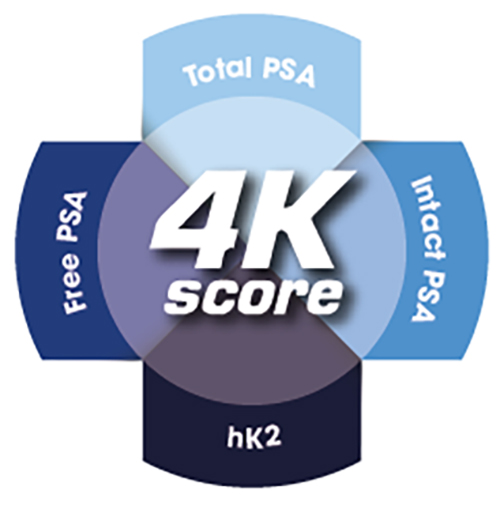
ARUP offers FDA approved Prostate- Specific Kallikrein, 4Kscore (test code 2014059) to help determine the risk of prostate cancer.
About the 4Kscore Test
- The 4Kscore Test is recommended for men concerned with their risk for high-grade, aggressive prostate cancer and is especially useful when considering a prostate biopsy.
- The 4Kscore Test measures four biomarkers: total PSA, free PSA, intact PSA, and hK2. Blood test results are combined in an algorithm with a patient’s age, digital rectal exam, and prior biopsy results to give physicians a personal risk score for each patient.
- Unlike traditional PSA tests, 4Kscore distinguishes men with a low risk for aggressive prostate cancer from those with a high risk. Individuals with a low-risk 4Kscore have a less than 1% chance of developing distant metastasis within the next 10 years.
- Physicians can identify patients with a high probability of having aggressive prostate cancer and offer appropriate treatment, while avoiding overtreatment of low-grade prostate cancer.
- While the 4Kscore Test can’t provide a prostate cancer diagnosis, it can help physicians and their patients decide whether or not to perform a biopsy based on the probability of the patient having potentially life-threatening prostate cancer.
4Kscore Test highlights:
- Non-invasive
- Looks at four prostate-specific biomarkers
- Predicts risk of high-grade prostate cancer
- Predicts long-term risk of distant metastasis
- Reduces overtreatment and unnecessary biopsies
- Allows physicians to make better treatment decisions for their patients
Do not use this test on a patient who:
- Has had a previous diagnosis of prostate cancer
- Is younger than 45 or older than 80 years of age
- Has received a DRE in the previous 96 hours (4 days) before phlebotomy; a DRE performed after the phlebotomy is acceptable
- Has received within the previous 6 months 5-alpha reductase inhibitor (5-ARI) therapy such as Avodart (dutasteride) or Proscar (finasteride)
- Has undergone within the previous six months any procedure or therapy to treat symptomatic BPH or any invasive urologic procedure that may be associated with a secondary PSA elevation prior to phlebotomy
Prostate Cancer Facts
- Prostate cancer affects only men.
- About 6 in 10 cases are in men age 65 or older.
- More than 200,000 men in the U.S. are diagnosed with prostate cancer every year.
- It is the second most common cancer among men in the U.S. (after lung cancer).
- Prostate cancer often has no early symptoms.
Resources
- American Cancer Society prostate cancer page.
- 4Kscore Test, visit: 4kscore.com
ARUP Consult®
















